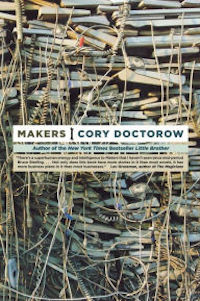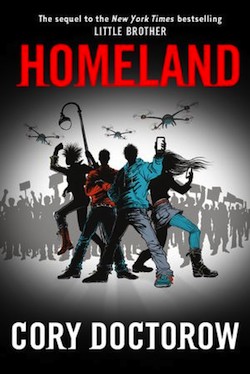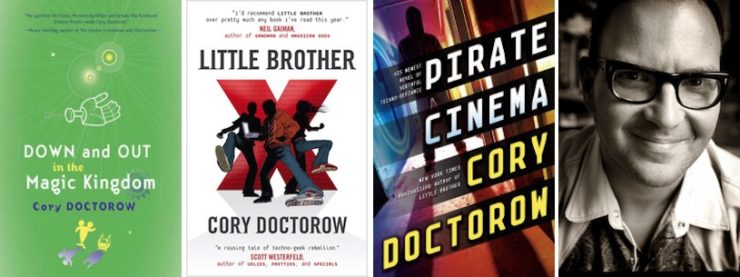The first novel by Cory Doctorow I read, some time in the early 2000s, was Down and Out in the Magic Kingdom. I read it, believe it or not, on a PalmPilot. I’m not bringing this up because that was Singularity-level technology for me at the time (even though it was!) but rather to illustrate just one of the reasons why Doctorow gained a loyal fan base early on in his career: he’s been releasing his books under Creative Commons licenses since the very beginning, meaning you can head to his website right now and download one or more of his novels or collections.
It’s also an illustration of what may be Doctorow’s most defining characteristic as an author: he wears his politics on his sleeve. Fiction or non-fiction, long form or short, Doctorow will work his opinions about copyright law or digital privacy or economic injustice into the text. For better or worse, whether you like it or not, these books come with a message, and Doctorow will make 100% sure that you get that message and then some. (It’s one of the main reasons why some readers don’t click with his fiction; I’ve heard people say they may as well read his Boing Boing columns, which often deal with the exact same issues.)
To each their own: I’ve always enjoyed Doctorow’s novels, because they’re fast-paced, funny, and full of interesting (if occasionally somewhat interchangeable) characters. Even if you happen to disagree with his opinions, at least they’re expressed clearly, intelligently, and out in the open, rather than hidden in the subtext. (They’re about as far removed from hidden in the subtext as possible, actually.)
So, with the release of Doctorow’s new novel Walkaway just a few days away, here are a few recommendations for possible entry points into Doctorow’s sprawling bibliography. I’ve split them up in three groups: “adult” fiction, YA fiction, and nonfiction.
Adult Fiction
Makers
 Here, I’m going to make it easy for you. Want to try out some Cory Doctorow? Fine, you don’t even have to leave this site. Doctorow’s novel Makers was serialized right here on Tor.com—click through and start reading!
Here, I’m going to make it easy for you. Want to try out some Cory Doctorow? Fine, you don’t even have to leave this site. Doctorow’s novel Makers was serialized right here on Tor.com—click through and start reading!
Makers is a perfect manifestation of some of the author’s recurring themes and subjects, in this case a near-future take on “maker culture”, which the author defines as “people who hack hardware, business-models, and living arrangements to discover ways of staying alive and happy even when the economy is falling down the toilet.” (With some minor tinkering, you could slap that same tag line on several of his other novels, including the forthcoming Walkaway.)
Down and Out in the Magic Kingdom
This was the author’s debut, as well as the first novel released under a Creative Commons license. I don’t think Doctorow would object too strongly to me describing him as a huge Disney geek, and this novel was the first indication of this preoccupation in his work. Most of it takes place in Walt Disney World in the 22nd Century, when the amusement park is run by rival “adhocracies” competing for a reputation-based currency called Whuffie. (For more Doctorow-Disney material, albeit somewhat darker than Down and Out, try the novella The Great Big Beautiful Tomorrow.)
With a Little Help
Doctorow has written some excellent short fiction over the years. If you’d rather jump in with some short stories before committing to an entire novel, check out With a Little Help, a collection the author put together with (as the title suggests) assistance from friends and fans for everything from cover illustrations to copy edits. (If you download the most recent version, you’ll find my name somewhere in the credits for catching a typo.) All that aside, it’s also just a great collection of stories. The story “Scroogled”, featuring immigration officials who use your Google search history to look for incriminating personal details, is practically the Platonic ideal of a Cory Doctorow story.
Young Adult Fiction
Little Brother and Homeland
 Little Brother is the novel that put Doctorow on the map, so to speak. The story of Marcus Yallow—a tech-savvy 17-year-old who gets caught up in a DHS sweep after a 9/11-style terrorist attack in San Francisco—became a New York Times bestseller and won multiple awards. Published during the tail end of the George W. Bush administration, it’s a perfect example of Doctorow’s ability to grab the zeitgeist by the scruff of the neck and extract a captivating story from it. That same zeitgeistiness (What? It’s a word and I like it.) is also part of the reason why Doctorow’s work occasionally loses some of its impact as the political landscape shifts and shifts again. (Another consequence of this is that the cutting-edge tech of the time sounds weirdly dated even just a few years later, resulting in things like “I checked the phone—my home PC had sent it an email.”)
Little Brother is the novel that put Doctorow on the map, so to speak. The story of Marcus Yallow—a tech-savvy 17-year-old who gets caught up in a DHS sweep after a 9/11-style terrorist attack in San Francisco—became a New York Times bestseller and won multiple awards. Published during the tail end of the George W. Bush administration, it’s a perfect example of Doctorow’s ability to grab the zeitgeist by the scruff of the neck and extract a captivating story from it. That same zeitgeistiness (What? It’s a word and I like it.) is also part of the reason why Doctorow’s work occasionally loses some of its impact as the political landscape shifts and shifts again. (Another consequence of this is that the cutting-edge tech of the time sounds weirdly dated even just a few years later, resulting in things like “I checked the phone—my home PC had sent it an email.”)
Interestingly, Doctorow actually revisited Marcus Yallow and company for Homeland, a follow-up novel set a handful of years after the conclusion of Little Brother. Quoting my own review, “Where Little Brother was clearly a child of the George W. Bush era, dealing with the domestic fallout of the War on Terror, the Patriot Act, ‘enhanced interrogation’ and so on, Homeland takes the same characters and fast-forwards them to roughly the beginning of this decade: the Great Recession, WikiLeaks, Anonymous, and an increasing level of disenchantment with the political process aimed at both sides of the proverbial aisle. Youthful techno-defiance during the first Obama term, basically.”
For the Win and Pirate Cinema
Maybe inspired by the success of Little Brother, Doctorow wrote two more YA novels following the same pattern: teenagers standing up for what’s right, using their facility with current technology to crack open and change unfair systems. In For the Win Doctorow applies this formula to inhumane working conditions for MMORPG gold farmers, whereas in Pirate Cinema he tackles draconian copyright laws. Viewed together along with Little Brother and Homeland, these novels may come across as somewhat formulaic, but individually they’re all fun, relevant YA novels I’d recommend to teenagers and adults alike.
Non-fiction
And then there’s the non-fiction, which ranges from essays to newspaper columns to blog posts and more. Depending on which bio you check, Cory Doctorow describes himself as a “science fiction author and activist” or an “activist and science fiction author.” The order doesn’t matter all that much because, as mentioned before, the author’s values and opinions on a wide range of topics permeate his novels and stories. At times Cory Doctorow reads somewhat like a more political Neal Stephenson, in terms of his willingness to take detours and side-bars in order to squeeze non-fictional material into his fiction. (To be fair, many of those infodumps don’t deal with politics at all: Homeland starts off with a guided tour of Burning Man that’s so detailed you’ll be able to draw a map of the event by the time you’re done, and there are a few times when Marcus gets going on the proper way to brew coffee that’ll have the caffeine-addicts among us salivating and taking notes.)
However, if you want to read Doctorow’s thoughts free of pesky distractions like characters and plot, Content and Context are two good collections of the author’s essays and columns. Fair warning: because Doctorow often writes about the intersection of information technology and politics, many of these essays from just a few years ago are already quite dated.
For more up-to-date material, check out Boing Boing, where Doctorow still blogs multiple times daily, and of course his own site. (Side note: I’ve become pretty good at blindly guessing which Boing Boing articles in my RSS feed were authored by Doctorow, just based on their titles.)
A while back I somehow found myself thinking up one of those check-the-right-box magazine quizzes to help decide if you’d enjoy Cory Doctorow’s writings. If you read Boing Boing or Slashdot regularly, add 10 points. If you’re annoyed by infodumps, subtract 10 points. If you’re politically liberal-leaning, add 5 points. If you read xkcd, add 10 points. (Doctorow is a recurring character!) Add 10 points each if you know how to jailbreak a mobile device, can list a minimum of two 3D printer models without checking Google, or subscribe to MAKE. And so on.
However, I often recommend his books to people who wouldn’t score very high on the Doctorow Compatibility Test (patent pending), simply because most of them are fun, fast, and thought-provoking reads — and that includes his forthcoming novel Walkaway, which I didn’t include here simply because I’m only about halfway through my advance copy.
Stefan Raets reads and reviews science fiction and fantasy whenever he isn’t distracted by less important things like eating and sleeping. You can find him on Twitter, and his website is Far Beyond Reality.











I first heard of Cory Doctorow when he spoke at my school during a conference (WWW@10). Before he spoke, I was like, “who’s this jerk in front of me typing away on his Macbook?” And then he got up on the stage and blew me away with his talk. I totally agree that his writing has a definitive agenda (which I generally mostly agree with), and that can be very distancing for some people who just see him as a jerk typing away on his Macbook (or is it Ubuntu now, I lost track).
My first Doctorow book was Eastern Standard Tribe, followed by Someone Comes to Town, Someone Leaves Town (which Cory sent me when I emailed him after the conference). I think I’ve read about 90% of his written stuff to date (and I have no excuse, since it’s all there for me to read whenever I want). Even his nonfiction is well worth reading. Even though I don’t always agree with him, I think his ideas are important to consider in today’s tech age. In addition, it’s good to know that he’s not just blowing steam: he practices what he preaches, and nowadays he’s a full time author who gives his books away.
My Doctorow score would be 60. Maybe 55, since infodumps don’t always work.
I’d also recommend Cory Doctorow’s Futuristic Tales of Here and Now, comic adaptations of some of his short stories.
The only one I have read is Someone Comes to Town, Someone Leaves Town which would be in the adult category and is about a man whose father is a mountain and his mother is a washing machine. He has a brother who is an island and another who is a murderous monster. He falls in love with a girl with bat wings.
It is also about the importance of free internet access.
I just wanted to say that I also read Down and Out in the Magic Kingdom on a Palm Pilot. That was a seriously terrible reading experience, and I don’t really remember anything about the book.
I don’t really have much to say about Doctrow’s writings. I also read Pirate Cinema and it didn’t really click with me. I get what he was going for, but it all seemed a little heavy-handed.
he’s been releasing his books under Creative Commons licenses since the very beginning
Not with walkaway though, as far as i know. No idea why.
@@.-@. That’s interesting, and a little troubling. I wonder if it’s due to the international publisher demands, as that’s the reason Pirate Cinema had that sneaky no-derivs clause added.
Yeah, it’s a damned shame and i wonder if this is the end of his novels being released under CC. Of course the irony being it won’t stop anyone downloading it illegally which was the whole point of him going with CC releases in the first place. You’d think that for an ever more established author such as himself there would be less restrictions not more.
@6. Thanks for asking him on Boing Boing (for everyone else, the question is answered here: https://twit.tv/shows/triangulation/episodes/295?autostart=false) . Looks like my theory was right. I hate being right sometimes.
No worries, i’ve been curious about it for a while. Sounds like his future novels won’t have CC licences either and i’m bummed about that, i’d often use his name as an example of a big author prepared to do that and yet still sell enough to be on best seller lists.